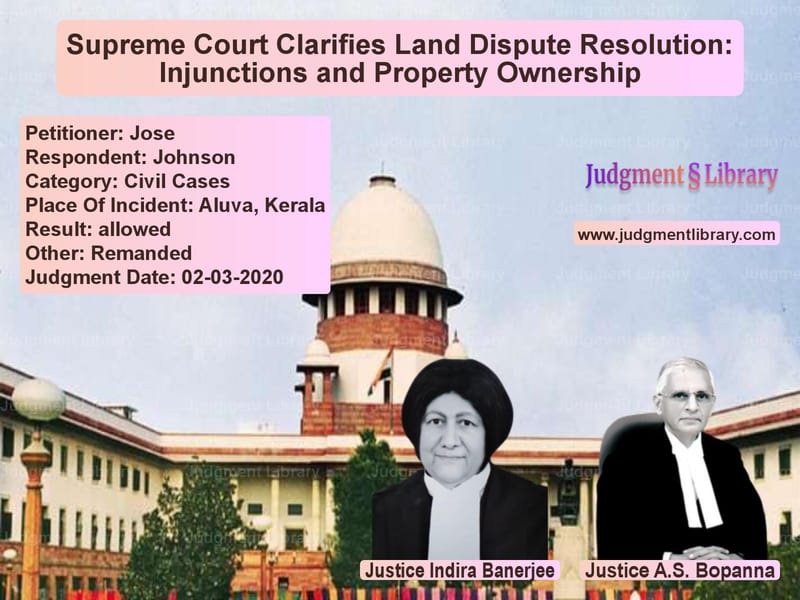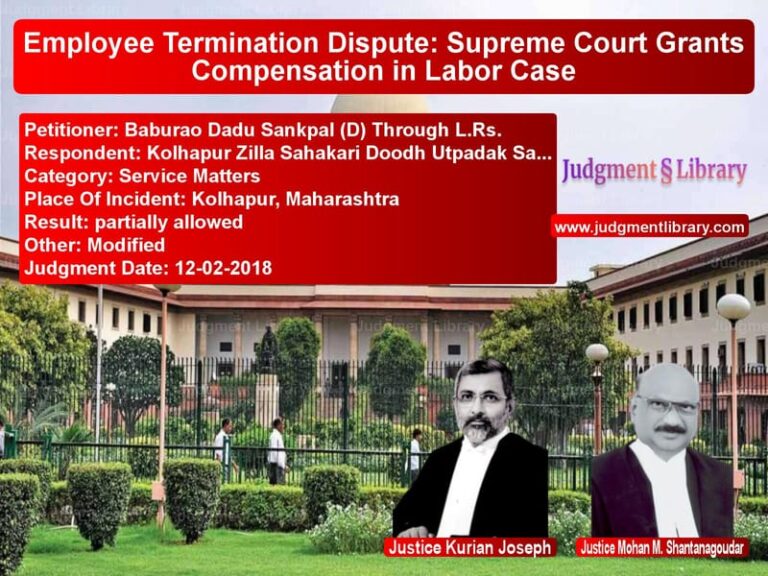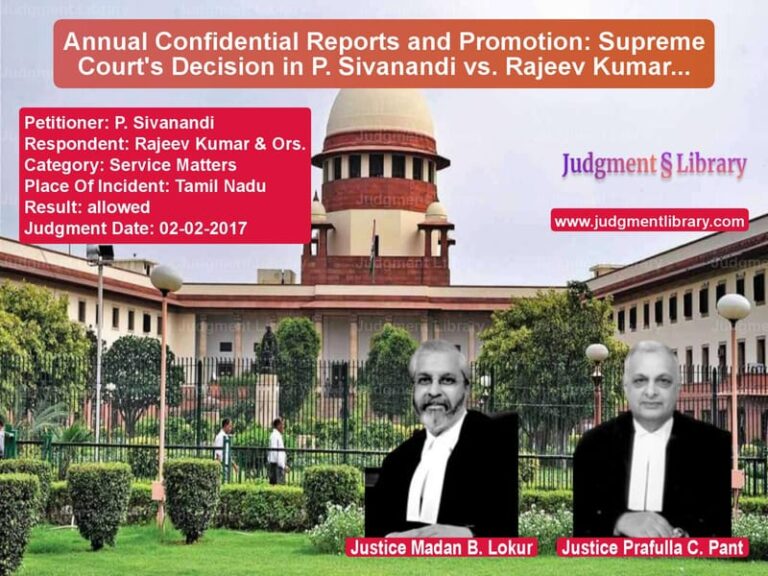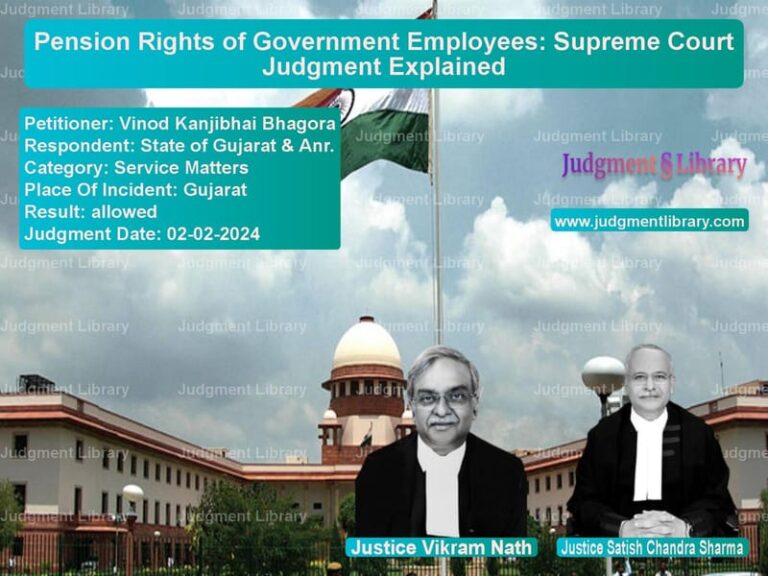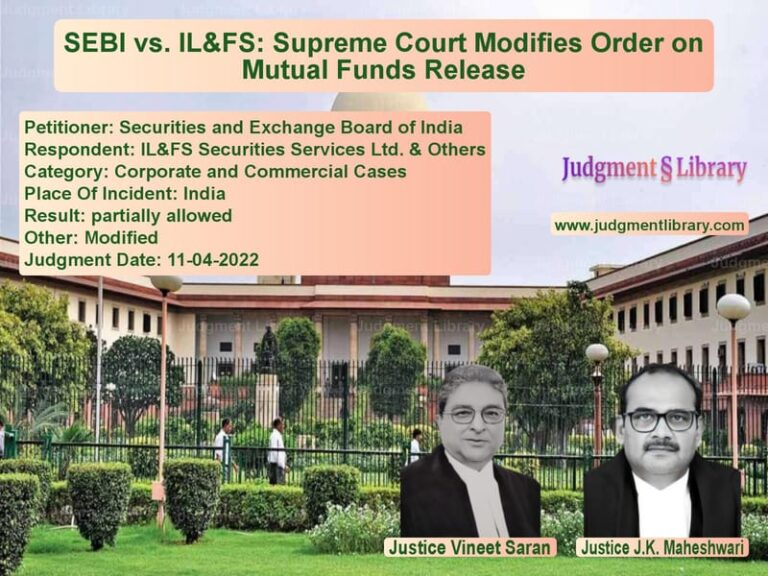Supreme Court Clarifies Land Dispute Resolution: Injunctions and Property Ownership
The present case deals with a civil dispute regarding land possession and ownership. The Supreme Court was tasked with determining whether a suit for a permanent prohibitory injunction could be maintained without first establishing ownership, especially when the ownership itself was in dispute. This case highlights the legal principles governing possession, property identification, and the rights of litigants in land disputes.
The core legal question before the Court was whether a plaintiff could seek an injunction without proving ownership when the defendant had challenged the very basis of possession.
Background of the Case
The dispute originated from a lawsuit (O.S. No. 288/2009) filed by the plaintiff in the Munsiff Court at Aluva, seeking a permanent prohibitory injunction against the defendant. The plaintiff alleged that the defendant was interfering with his possession of a plot of land. The trial court ruled in favor of the plaintiff and granted the injunction. The defendant, dissatisfied with the decision, appealed before the Additional District Judge (A.S. No. 186/2011), who set aside the trial court’s judgment and remanded the case for fresh consideration.
The plaintiff then challenged the appellate court’s decision before the Kerala High Court (FAO (RO) No. 229/2014), which restored the trial court’s decree. The defendant, feeling aggrieved, brought the case before the Supreme Court.
Petitioner’s Arguments
The defendant argued:
- The suit was not maintainable as the plaintiff had not first sought a declaration of ownership, despite the fact that ownership was being disputed.
- The trial court had incorrectly assumed the plaintiff’s ownership and possession without adequately considering the defendant’s claims.
- The first appellate court had correctly found that the trial court had rushed the case without allowing sufficient opportunity to present additional evidence.
- The case required remand to ensure the proper identification of the disputed property with the assistance of a land surveyor.
Respondent’s Arguments
The plaintiff countered:
- The suit was purely for an injunction, and under settled legal principles, title need not be established if possession is proved.
- The first appellate court had gone beyond its jurisdiction by ordering a remand, despite there being no need to determine ownership.
- The High Court had correctly restored the trial court’s order, as possession was clearly established in the evidence presented.
- The defendant was merely attempting to delay the proceedings by introducing unnecessary complexities regarding ownership.
Supreme Court’s Observations
The Supreme Court analyzed the legal principles surrounding injunctions in land disputes and made the following key observations:
“If the defendant challenges the right of the plaintiff, and not merely the interference with possession, the plaintiff cannot avoid the question of title.”
The Court noted that while possession is generally sufficient to obtain an injunction, certain cases require a deeper analysis:
“Each case will have to be examined on its own merits, keeping in view the nature of the pleading put forth before the trial court and the understanding of the case with which the parties have gone to trial.”
Key Legal Precedents Considered
The Court referred to the following judgments in its analysis:
- Ravinder Kaur Grewal v. Manjit Kaur (2019) 8 SCC 729: This case emphasized that possession alone could be the basis for seeking an injunction, even when adverse to the owner.
- Order 41 Rule 23A CPC: This provision allows appellate courts to remand cases if a fresh trial is necessary. The Supreme Court had to decide whether the appellate court correctly exercised this power.
- Principles of property identification: The Court stressed that in cases where there is ambiguity regarding property boundaries, a land survey must be conducted before ruling on possession.
Final Judgment
The Supreme Court ruled in favor of the defendant, setting aside the Kerala High Court’s order and restoring the judgment of the first appellate court. The case was remanded to the trial court for reconsideration with clear directions:
“The trial court must properly identify the disputed property, allow additional evidence if necessary, and resolve any conflicts regarding possession and ownership before granting or denying an injunction.”
The Court emphasized the importance of fair trial procedures and due process:
“A trial court must ensure that both parties have had adequate opportunity to present their case, especially when factual disputes regarding property identification exist.”
Implications of the Judgment
This ruling has significant implications for land dispute cases:
- Plaintiffs seeking injunctions must be prepared to prove possession, especially when their ownership is challenged.
- Trial courts must ensure that properties are correctly identified before issuing rulings on possession.
- Appellate courts have the power to remand cases when they find procedural deficiencies in the trial court’s handling of evidence.
- Defendants can challenge injunctions by raising substantial disputes regarding ownership, forcing plaintiffs to clarify their claims.
The Supreme Court’s ruling reinforces the principle that land disputes must be handled with a focus on due process, factual clarity, and fairness to both parties. The case serves as a precedent for similar disputes where possession and ownership are contested.
Petitioner Name: Jose.Respondent Name: Johnson.Judgment By: Justice Indira Banerjee, Justice A.S. Bopanna.Place Of Incident: Aluva, Kerala.Judgment Date: 02-03-2020.
Don’t miss out on the full details! Download the complete judgment in PDF format below and gain valuable insights instantly!
Download Judgment: Jose vs Johnson Supreme Court of India Judgment Dated 02-03-2020.pdf
Direct Downlaod Judgment: Direct downlaod this Judgment
See all petitions in Property Disputes
See all petitions in Landlord-Tenant Disputes
See all petitions in Specific Performance
See all petitions in Judgment by Indira Banerjee
See all petitions in Judgment by A. S. Bopanna
See all petitions in allowed
See all petitions in Remanded
See all petitions in supreme court of India judgments March 2020
See all petitions in 2020 judgments
See all posts in Civil Cases Category
See all allowed petitions in Civil Cases Category
See all Dismissed petitions in Civil Cases Category
See all partially allowed petitions in Civil Cases Category

